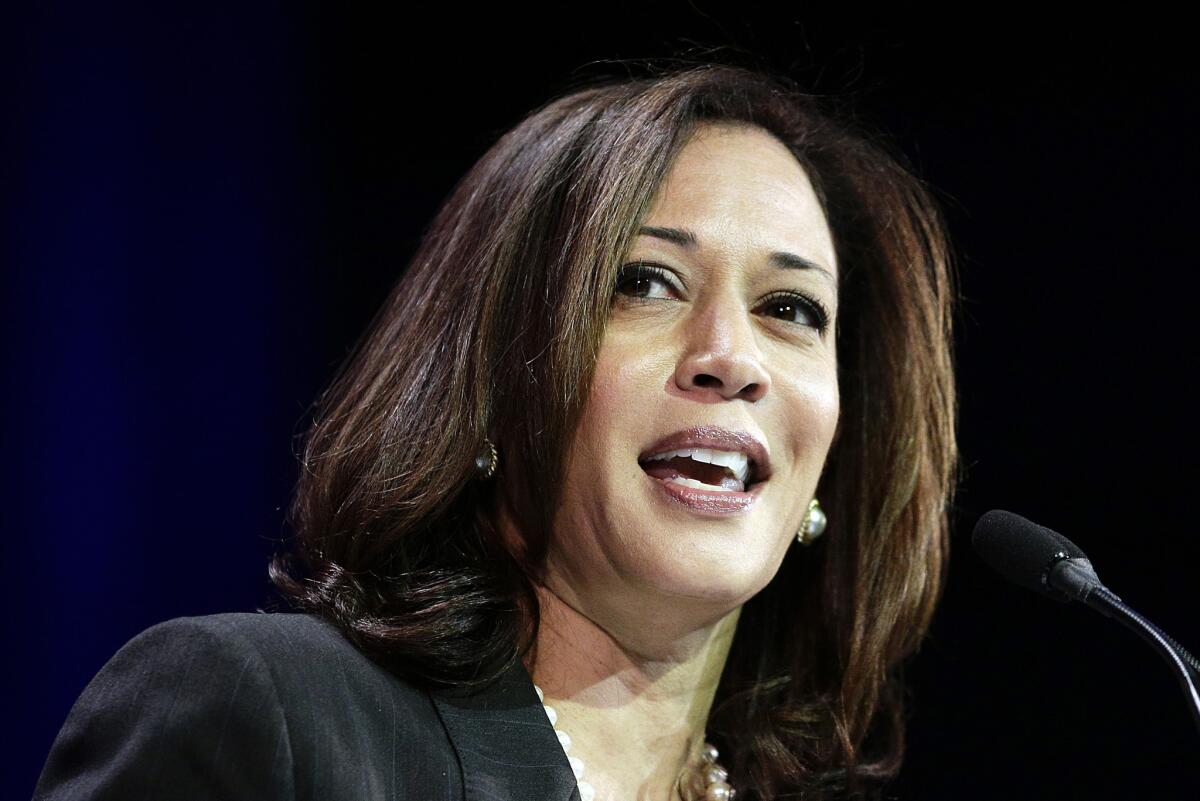Atty. Gen. Kamala Harris brings a fighting tone to friendly territory

California Atty. Gen. Kamala Harris has dismissed the idea that her top challenger, Rep. Loretta Sanchez (D-Garden Grove), has an advantage in Southern California.
- Share via
Reporting from Escondido, Calif. — Only at the end of her speech -- almost as an after-thought -- did California Atty. Gen. Kamala Harris ask for votes Saturday in her run for U.S. Senate.
But Harris was in friendly territory, with a fighting tone and themes that repeatedly brought cheering and applause from several hundred people attending the San Diego County Democratic Convention.
But cheering is one thing; votes are another.
In the June primary, Harris’s main opponent appears to be Rep. Loretta Sanchez (D-Garden Grove). It remains to be seen how well Harris, a former district attorney for San Francisco, will do against Sanchez in Southern California.
See the most-read stories this hour >>
Because of California’s “top-two” primary system, Harris and Sanchez could joust both in the June primary and the November 2016 general election to succeed Democratic icon Sen. Barbara Boxer.
Sanchez was invited to the convention but had a scheduling conflict, said Francine Busby, chairwoman of the county Democratic Party.
Harris, whose 22-minute speech was the highlight of the convention’s morning session, dismissed the idea that Sanchez has an advantage in Southern California.
“I’ve run statewide twice,” Harris said, “and my experience is the issues that people care about … cross ideological lines.”
Not everyone is so sure about San Diego County.
“I don’t think it’s going to be a walk, but Loretta definitely has an advantage,” Busby said.
Interested in campaigns and governing? Sign up for the free Essential Politics newsletter >>
Escondido Councilwoman Olga Diaz said the regional contest between Harris and Sanchez will probably be decided not on ideology but on that homely part of campaigning called “the ground game.”
“Neither has much of a [campaign] infrastructure here,” Diaz said.
Mark Arabo, a leader in the Chaldean community of eastern San Diego County, said that, at least in the early going, Harris appears to be out-campaigning Sanchez, although the congresswoman has the disadvantage of being in Washington while the attorney general remains in California.
“Harris is more active, she’s everywhere,” Arabo said. “I’ve not seen Loretta once, and she’s a friend.”
But the runoff is a year away, and having a Latina on the ballot could energize Latino voters, said Assemblywoman Lorena Gonzalez (D-San Diego). “Having a Latina in statewide office could be wonderful,” she said.
Tim Allison, Sanchez’s campaign manager, in a telephone interview said the campaign is confident that Sanchez has the advantage in Southern California.
“Rep. Sanchez, having represented Southern California for 19 years, has developed relationships, contacts and a broad understanding of the issues involving San Diego and all of Southern California,” he said. “We think we’re going to do very well throughout California, but in Southern California we think we have an advantage.”
He added that Sanchez has campaigned in San Diego County four times in the last two months, with more visits planned.
A USC Dornsife/Los Angeles Times poll in September found Harris leading Sanchez 26% to 17% among registered voters, followed by former state GOP chairman Tom Del Beccaro with 10% and Assemblyman Rocky Chavez (R-Oceanside) with 9%. George “Duf” Sundheim, another former California Republican party leader, entered the race too late for inclusion in that poll.
“Unless the Republicans coalesce behind one single candidate, we will probably end up seeing a runoff between two Democrats,” said poll director Dan Schnur, who leads USC’s Jesse M. Unruh Institute of Politics.
The poll found that Latino voters prefer Sanchez over Harris 34% to 18%.
The only areas where Sanchez was leading Harris were San Diego, Orange, Riverside, San Bernardino and Imperial counties. In the San Francisco Bay Area, Harris was favored over Sanchez 40% to 16%. In Los Angeles, where Harris has an office and often gives speeches, she led Sanchez 30% to 20%.
Recent campaign financial reports showed the Harris campaign with $3.3 million in the bank, and Sanchez with $1.6 million. But Harris has been spending money at a faster clip than Sanchez, possibly to raise her profile in Southern California, where Sanchez has been a member of Congress since 1996.
In her speech Saturday, Harris praised the San Diego County area as “an incredibly beautiful, important region of the state” and identified herself as a “proud daughter of California.”
She reminded the audience that, as attorney general, she refused to defend Proposition 8, the statewide measure that banned same-sex marriage. She criticized the congressional hearing in which the head of Planned Parenthood was “grilled like she is a criminal.”
NEWSLETTER: Get the best from our political teams delivered daily.
Immigrants living here illegally, she said, deserve a path to citizenship: “The undocumented immigrant is not a criminal.”
Harris indicated that she does not plan a Southern California-specific campaign, but rather will continue her emphasis on education, the environment and equality, particularly efforts to improve early childhood education, income parity for women and better family-leave policies.
“When you lift up the economic status of women, you lift up the economic status of families and communities,” she said to applause.
Twitter: @LATsandiego
ALSO:
Hillary Clinton borrows a page from Obama’s 2008 playbook
$68-billion California bullet train project likely to overshoot budget and deadline targets
More to Read
Get the L.A. Times Politics newsletter
Deeply reported insights into legislation, politics and policy from Sacramento, Washington and beyond. In your inbox twice per week.
You may occasionally receive promotional content from the Los Angeles Times.










